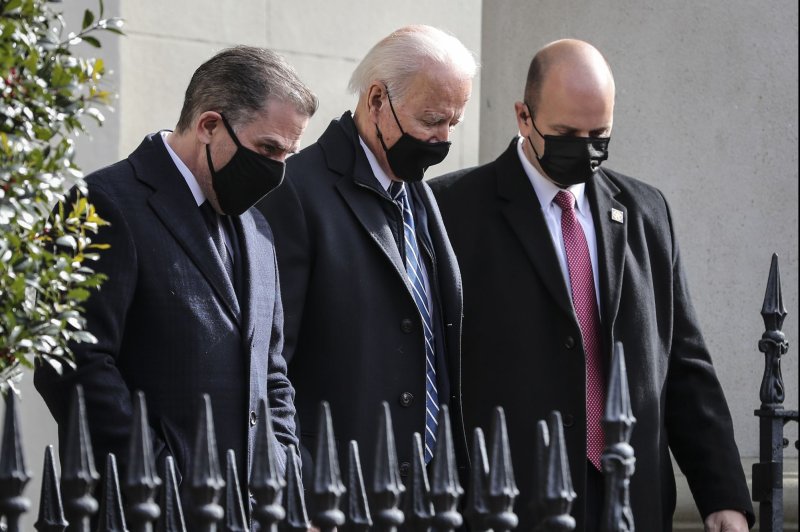1 of 5 | President Joe Biden (C) and son Hunter Biden (L) leave the Holy Trinity Catholic Church in the Georgetown neighborhood of Washington, D.C., on January 24. File Photo by Oliver Contreras/UPI |
License Photo
June 15 (UPI) -- Catholic bishops are scheduled to vote this week on drafting a statement that would include guidance on whether elected officials who support abortion rights, such as President Joe Biden, should receive communion.
The vote is among the items on the agenda of the U.S. Conference of Catholic Bishops, which is meeting in a virtual general assembly on Zoom that begins Wednesday. The question before the bishops is whether work on the statement can begin.
If that request is approved, the earliest the document could be presented to the bishops would be at their November general assembly.
Bruce Morrill, a theological studies professor at Vanderbilt University in Nashville, said the proposal is clearly directed toward Biden, the nation's second Catholic president.
While campaigning for the presidency, Biden proposed a healthcare plan that would expand access to contraception and abortion and restore funding to Planned Parenthood. In addition, the plan sought to prevent states from passing laws to outlaw abortion.
On Jan. 20, the day Biden was inaugurated, USCBB's president, Archbishop José H. Gomez of Los Angeles, issued a statement saying "the continued injustice of abortion" remains the preeminent priority of the bishops.
"We have deep concerns about many threats to human life and dignity in our society," Gomez said in the document, titled Statement on the Inauguration of Joseph R. Biden Jr. as 46th President of the United States of America. "But as Pope Francis teaches, we cannot stay silent when nearly a million unborn lives are being cast aside in our country year after year through abortion."
The archbishop also said in the statement that "our new president has pledged to pursue certain policies that would advance moral evils and threaten human life and dignity, most seriously in the areas of abortion, contraception, marriage and gender."
Gomez added that Catholic bishops are not partisan players in the nation's politics, and when they speak on issues, they try to guide consciences.
In a 2004 letter to American bishops, the Vatican said that a politician consistently campaigning and voting for permissive abortion and euthanasia laws constitutes "personal formal cooperation" in grave sin.
In those situations, "the pastor should meet him, instructing him about the church's teaching, informing him that he is not to present himself for holy communion until he brings to an end the objective situation of the sin and warning him that he will otherwise be denied the holy eucharist," according to that letter.
The decision to refuse to give someone communion is not a sanction or penalty, the letter said.
"Nor is the minister of holy communion passing judgment on the person's subjective guilt, but rather (he) is reacting to the person's public unworthiness to receive holy communion due to an objective situation of sin," the letter said.
The letter -- written by Cardinal Joseph Ratzinger, who later became Pope Benedict XVI -- was a response to a controversy over Democratic presidential candidate John Kerry's support of abortion rights. Some U.S. bishops had said Kerry, a practicing Roman Catholic, should be barred from receiving communion.
Other Catholic politicians recently have been the targets of assertions that they should not receive communion, including House Speaker Nancy Pelosi, D-Calif., and Virginia Sen. Tim Kaine, the Democratic vice presidential nominee in 2016.
In 2019, when Biden attended Mass at a church in Florence, S.C., where he had been campaigning, the priest refused to give him communion because of his support for legalized abortion.
Under current procedures, the bishop or archbishop of the diocese where a Catholic lives makes the determination about whether communion should be withheld, Morrill said. Targeting public officeholders and candidates in a statement politicizes the eucharist, he said.
"The controversy in this is that the bishops conference has no authority to start declaring unilaterally who can or cannot receive communion," said Morrill, who is Vanderbilt's chair of Roman Catholic studies.
He said controversies inevitably will keep happening because bishops "have failed to persuade their own American Catholics that abortion should not be an elective procedure legally available to women in the United States."
A compilation of findings in surveys conducted over the years by the Pew Research Center, including one in 2019 that addressed the U.S. Supreme Court's Roe vs. Wade decision that established a right to abortion, show that 56% of American Catholics say abortion should be legal in all or most cases.
Jayd Henricks, former USCCB executive director of government relations, disagrees that communion is being politicized.
"Of course, there's a political dimension relative to the public witness of politicians, including President Biden, who professes to be a devout Catholic and yet opposes the church's very fundamental teachings," Henricks said. "But the concern of the bishops here, it seems to me, is not about the political situation so much as it is about the pastoral situation. The church teaches that the eucharist is our food that helps us save our souls."
Henricks -- who has not been involved in conversations with bishops about the issue and stressed that he is speaking only for himself -- also said there is nothing new in what the USCCB will be considering.
"It's going to be re-presenting in a pastoral way, teachings that existed for years now," he said.















